The Festival of (In)appropriation #10
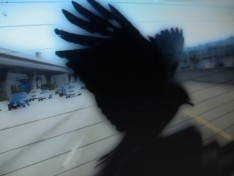
Drive with Persephone by Mille Feuille
Friday - Sunday June 12-14, 2020, Online
Los Angeles Filmforum and Northwest Film Forum present
The Festival of (In)appropriation #10
Discussion
** Co-curators Jaimie Baron, Lauren Berliner, and Greg Cohen will be joined by Adam Hyman of LA Filmforum to host a Zoom Q&A with filmmakers Jennifer Proctor, Penny Lane, Phoebe Tooke, and composer Wayne Grim on June 13 at 5pm PDT. We will send all registrants a link to join the Zoom that day! A recording of the conversation will accompany remaining screenings. **
https://nwfilmforum.org/films/festival-of-inappropriation-10-encore-online/
BLACK LIVES MATTER. In recognition of the importance of the current moment, NWFF is donating ALL PROCEEDS from our June film screenings to organizations that empower the Black community, including Black Lives Matter Seattle-King County, Rainier Valley Community Clinic, Trans Women of Color Solidarity Network, and other organizations to be announced. Learn more about this initiative here or donate directly to NWFF: https://nwfilmforum.org/news/black-lives-matter-freedom-fund-trans-women-solidarity/
Collage or compilation. Found footage film or recycled cinema. Remix or détournement. Whatever one might call it, the practice of incorporating preexistent media into new artworks engenders novel juxtapositions, new ideas, and latent connotations… often entirely unrelated to the intentions of the original makers. In that regard, such works are truly “inappropriate.” Indeed, the act of (in)appropriation can reveal unimagined relationships between past and present, here and there, intention and subversion, artist and critic, and perhaps even compel us to reexamine what it means to be the "producer" or "consumer" of visual culture itself.
Fortunately for our purposes, the past decades have witnessed the emergence of countless new kinds of audiovisual material available for artistic (in)appropriation. In addition to official state and commercial archives, resources like vernacular collections, home movie repositories, and digital archives now provide the artist with a wealth of fascinating matter to reprocess, repurpose, and endow with new meaning and resonance.
Founded in 2009 and curated by Jaimie Baron, Greg Cohen, and Lauren Berliner, the Festival of (In)appropriation is a yearly showcase of contemporary, short-form, audiovisual works that appropriate existing film, video, or other media and redeploy them in “inappropriate” and inventive ways. This year marks the culmination of the Festival’s first decade, with a program that ranges from militant political documentary, uncanny TV supercuts, and raucous re-mix juggernauts, to quasi-DIY orphan film animations, haunting YouTube mash-ups oozing with existential teen angst, and a brooding digital experiment performed upon a single, black-and-white, still photograph.
Watch this conversation about Festival of (In)appropriation #8 between Curator Greg Cohen and film scholar Constance Penley at UCSB’s Carsey-Wolf Center (10/27/2016): https://vimeo.com/191083847
Read this review of Festival of (In)appropriation #7 (2015) in Artillery magazine: http://artillerymag.com/festival-inappropriation-7/
Check out this interview by Laura Wissot with curators Jaimie Baron and Greg Cohen in Filmmaker magazine: http://filmmakermagazine.com/84086-the-festival-of-inappropriation-6-at-los-angeles-filmforum/ - .Uv6Qlf0dq89
- • HOW TO WATCH • •
Purchase a ticket through Brown Paper Tickets at https://www.brownpapertickets.com/event/4607385
Registrants will get an email receipt from Brown Paper Tickets containing a link and password for viewing, under “Ticket Details”. (Don’t see it? Check your spam filter.) The password will expire at midnight PDT on June 14.
If you encounter any issues logging in, please contact louie@nwfilmforum.org for a quick follow-up.
Tickets: Sliding scale at https://www.brownpapertickets.com/event/4607385
For more event information: www.lafilmforum.org, or 323-377-7238
Visit the Festival of (In)appropriation at https://festivalofinappropriation.com/
----------------------
Penny Lane makes innovative nonfiction films, including four features – most recently Hail Satan? which premiered at the 2019 Sundance Film Festival – and over a dozen short films. She has received grants and awards from the Sundance Institute, Sundance Film Festival, Cinereach, Creative Capital, Chicken & Egg Pictures, Ann Arbor Film Festival, Tribeca Film Institute, Wexner Center for the Arts and many others. She has been honored with retrospectives at the Museum of the Moving Image, San Francisco DocFest, Open City Documentary Festival and Cinema Moderne. In 2017 she was admitted to the Academy of Motion Picture Arts and Sciences. Penny Lane is her real name.
Jennifer Proctor is a filmmaker and media artist. Her award-winning found footage work examines the history of experimental film, Hollywood tropes, and the representation of women in cinema, and has screened around the world, including the Edinburgh Film Festival, Antimatter Film Festival, Ann Arbor Film Festival, LA Filmforum, South by Southwest, and Anthology Film Archives. She is an Associate Professor of Journalism and Screen Studies at University of Michigan-Dearborn and co-founder and director of EDIT Media (Equity, Diversity, and Inclusion in Teaching Media). EDIT Media is a faculty-driven national initiative dedicated to researching, developing, and educating about best practices in inclusive teaching in college-level media programs. In her spare time, she contributes to the Instagram account, @experimentalcinecats
Phoebe Tooke, maker of derivation of the mean lifetime, and a native New Orleanian, is now a San Francisco based social worker turned filmmaker and video artist. She stays away from actors, so her work tends to be documentary and experimental in nature. She has had work screen at the Telluride Film Festival, Ann Arbor Film Festival, Silverdocs, Slamdance and the Black Maria Film Festival. She has received awards including a Student Academy Award from the Academy of Motion Pictures, a Golden Gate Award from the San Francisco International Film Festival and “Best Documentary Film” from the Documentary Film Institute. When not working on her own work, Phoebe can be found at the Exploratorium Museum working as a video producer. She received her MFA in Film Production from San Francisco State University in 2008.
Wayne Grim, sound for derivation of the mean lifetime, is a sound artist, musician, composer, and improviser. His work spans a variety of areas such as generative music, spontaneous composition, non-western musical techniques, improvisation, durational works, minimalism, noise, conceptual art, and the sonification of scientific phenomena. Wayne received his MFA in composition at Mills College in 2000. He currently curates and produces sound works for the Exploratorium Museum in San Francisco.
Jaimie Baron (Festival Director) Jaimie Baron is an Assistant Professor of Film Studies at the University of Alberta. Her work on documentary, experimental film and video, audiovisual appropriation, and digital media has been published in numerous journals and anthologies. Her first book, The Archive Effect: FoundFootage and the Audiovisual Experience of History, was published in 2014. She is also a co-founder of Docalogue, an online space for scholars and filmmakers to engage in conversations about contemporary documentary.
Greg Cohen is an artist, Associate Programmer at Los Angeles Filmforum, and Lecturer in Latin American Cinema and Visual Culture at UCLA. His work in video, photography, and multi-media installation has been exhibited nationally and internationally, and draws on diverse intellectual and aesthetic interests, from landscape theory and aesthetic philosophy to cultural memory and experimental archives, and from the history and theory of architecture to the intersections of moving-image media and radical politics. As a founding associate of REASArch (group for Research on Experimental Accumulation and Speculative Archives), Cohen has also produced The Valaco Archive, an ongoing visual research project (https://valacoarchive.com), parts of which were recently featured in Limn magazine (http://limn.it/).
Lauren S. Berliner is an Assistant Professor of Media & Communication and Cultural Studies at University of Washington Bothell. Her research focuses on participatory media production practices, gender and sexuality, and pedagogy. Also a filmmaker, she has screened her work internationally and has facilitated video production programming for girls and queer youth. She earned her PhD. in Communication from UC San Diego, an MA in Visual and Media Art from Emerson College, and a BA in English and Anthropology from Wesleyan University.
----------------------
Los Angeles Filmforum screenings are supported by the Los Angeles County Board of Supervisors through the Los Angeles County Department of Arts & Culture, the Department of Cultural Affairs, City of Los Angeles, the Wilhelm Family Foundation, the Academy of Motion Picture Arts & Sciences, and the American Cinematheque. We also depend on our members, ticket buyers, and individual donors.
Identity Parade
Identity Parade
By Gerard Freixes Ribera (Spain, digital video, b/w, sound, 2017, 04:18)
A private conversation between a couple at a costume ball gets increasingly bizarre as the two characters reveal their true faces to each other, again and again. Delving into the archive to forage for found footage, Ribera deploys the tools of digital manipulation to warp the time and space of film history. Identity Parade, in turn, asks us to imagine the many masks we wear and how they shape our most intimate interactions. (Lauren Berliner/Greg Cohen)
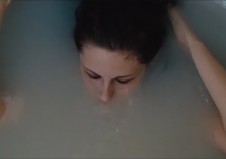
Nothing a Little Soap and Water Can’t Fix
Nothing a Little Soap and Water Can’t Fix
By Jennifer Proctor (USA, digital video, color, sound, 2017, 09:15)
In films, as in life, the bathtub is often considered a private space for women – a place not only to groom, but to relax, to think, to grieve, to be alone, to find sanctuary. For Hollywood, though, it’s also a place of naked vulnerability, where women narratively placed in harm’s way have no escape. Using appropriated movies, this experimental found footage work deconstructs the representations of women in this domestic space as historically framed in popular film. (Jennifer Proctor)
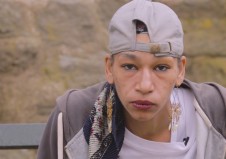
Acting Erratically
Acting Erratically
By Tuff Guts, Hazel Katz, Daniel Goodman (USA, HD video, color, sound, 2018, 15:08)
“Acting erratically” is a term typically used by law enforcement when they believe they are encountering someone experiencing mental distress. This short film explores the connections between freedom of movement and state sanctioned violence in the lives of NYC-based women and gender-non-conforming people of color by critically engaging with the archive and using found footage as metaphorical architecture. A narrative of resistance is explored through the first person by Mecca, who re-appropriates the idea of Acting Erratically as a powerful and performative response to systemic oppression and police violence. This film was made collaboratively with members of Picture The Homeless and Black Youth Project 100 (NYC Chapter). (Tuff Guts, et. al.)
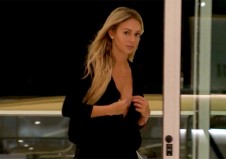
Normal Appearances
Normal Appearances
By Penny Lane (USA, HD video, color, sound, 2018, 05:00)
In Normal Appearances, Penny Lane’s nearly-silent recut of the reality TV show The Bachelor, we see a series of different women perform the same gestures in succession, thereby exposing not only the scripted nature of all of the movements in the show, but also the ways in which femininity itself, as narrowly defined by popular culture, is a set of performed elements that – once isolated and repeated – reveal its arbitrary nature. Even when the emotion appears to be real, the way in which the women brush away their tears indicates their learned compulsion to perform their gender according to the unspoken rules of contemporary “romance.” (Jaimie Baron)
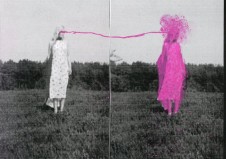
E
E
By Anna Malina Zemlianski (Germany, digital video, sound, color, 2018, 02:21)
In the unearthly world of E, hand-made meets hi-tech as characters appear to consume one another with their own, trafficked liknesses. Constructing her work entirely from laser-printed film stills (approximately 770 in total) lifted from Niklaus Schilling’s 1972 horror film, Nachtschatten, Zemlianski tears, collages, and paints these images with pastels and charcoal, then scans them back together into a bracing animation set to the eponymous song (“E”) by the Berlin-based band, Comb. (Lauren Berliner/Greg Cohen)
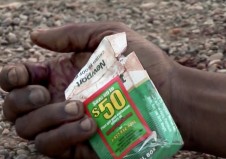
Only the Dead
Only the Dead
By Aaron Valdez (USA, digital video, color, sound, 2016, 03:45)
Repetition gives rise to hilarity as a dramatic male voiceover pronounces the word “dead, “the phrase “where he dies,” or variations thereof over and over again in Aaron Valdez’s Only the Dead. Yet, the silliness of the supercut form is countered by the awareness that we are looking – however briefly and obliquely – at images of actual dead bodies aired previously on the reality show The First 48. The televisual iconography of real human death – a motionless hand or foot, a spatter of blood, a slumped body only partially visible behind a door – is articulated as an impoverished vocabulary for representing genuine trauma. In this film, each cut is literally correlated with the extinguishment of a human life. (Jaimie Baron)
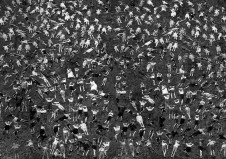
derivation of the mean lifetime
derivation of the mean lifetime
By Phoebe Tooke (USA, digital video, b/w, sound, 2015, 08:40)
A single black and white photograph of scores of children sprawled in a field of grass, shot from overhead and at an appreciable distance. Slowly, subtly, a series of “meditative gestures” (as the artist refers to them) begin to “animate” the stillness of the original image. Something has gone awry. Time and loss pervade the stillness, though nothing appears to have changed… or has it?.. The result is a deeply evocative, disquieting investigation of attention, memory, disappearance, and human folly, made all the more poignant (if no less mysterious) by the revelation of the photo’s title and date at the end of the work. (Greg Cohen)
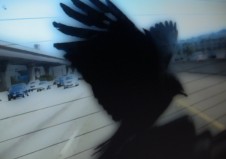
Drive with Persephone
Drive with Persephone
By Mille Feuille (Canada, HD video, color, sound, 2018, 10:30)
On the most basic of levels, Drive with Persephone recasts the ancient myth of Persephone’s abduction in the language of YouTube “drive-with-me” vlogs. On closer inspection, the work is so much more, perhaps above all in its compassionate register of the perils and exultations of adolescence, and the wisdom and cruelty of old age. A timely, potent rumination on the enduring, immutable cycle of life and death, Mille Feuille’s video confronts—with a mixture of stoicism and defiant hope—the unmooring of social life in our apparently hyper-connected world. (Greg Cohen)
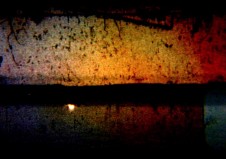
Sand
Sand
By Brice Bowman (USA, 8mm transferred to digital video, color, sound, 2015, 08:48)
At the outset of Brice Bowman’s Sand, the frame of the rephotographed home movies that furnish the raw material for his film appears shunted slightly towards the lower right quadrant of the screen. It is a harbinger of the spectral, mesmerizing experiment to ensue, alerting us to the uncanny sense of loss that comes with the recovery of private documents. Here, the medium of film is adapted to the format of the family album… in this case one that is scavenged from an estate sale, a flea market, a rummage store somewhere. To the vaguest sounds of beach-goers and ocean waves, we scroll and scan, sift and sort—turning slowly here, flipping more quickly there—through a humble catalogue of past lives and forgotten places, in all their affecting, comforting anonymity and triviality. (Greg Cohen)
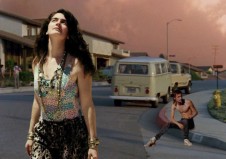
The Was
The Was
By Soda_Jerk (Australia, HD video, color, sound, 2016, 13:40)
A sample-based video for now, about the time before now. Part experimental film, part music video and concept album, The Was is the collaborative meeting of Australian sample artists Soda_Jerk and The Avalanches. Constructed from over a hundred rotoscoped film samples, The Was is a de/tour de force through the neighborhoods of collective memory. (Soda_Jerk)
